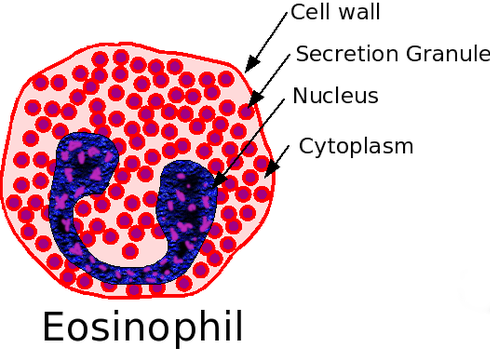Eosinophilia
Eosinophils are a type of white blood cell. They contain particles filled with chemicals that fight off infections and play a role in your body’s immune response. Normally your blood doesn’t have a large number of Eosinophils. Your body may produce more of them in response to allergic disorders, inflammation of the skin, and parasitic infections. They can also increase in response to some infections or to some bone marrow disorders. In some conditions, the Eosinophils can move outside the bloodstream and into organs and tissues.
Eosinophils usually account for less than 7% of the circulating leukocytes (100 to 500 Eosinophils per microliter of blood). These cells have a role in the protective immunity against certain parasites but also contribute to the inflammation that occurs in allergic disorders.
An increased number of Eosinophils in the blood (Eosinophilia) usually indicates the response of the body to abnormal cells, parasites, or substances that cause an allergic reaction (allergens).
Idiopathic hypereosinophilic syndrome is a disorder in which the number of Eosinophils increases to more than 1,500 cells per microliter of blood for more than 6 months without an obvious cause.
People of any age can develop idiopathic hypereosinophilic syndrome, but it is more common in men older than 50. The increased number of Eosinophils can damage the heart, lungs, liver, skin, and nervous system. For example, the heart can become inflamed in a condition called Löffler’s endocarditis, leading to formation of blood clots, heart failure, heart attacks, or malfunctioning heart valves.
Signs and Symptoms
May include
· Soreness of throat,
· Nose blocking,
· Sneezing,
· Headache,
· Pains in the body
· Rise in temperature.
· Psychological stress,
· Some time wheezing also present
· night sweats,
· fatigue,
· cough,
· chest pain,
· swelling,
· stomach-ache,
· rashes,
· weakness,
· weight loss,
· Cold is basically a problem that starts in the nose and throat, but gradually tends to affect the whole body. So, take remedial measure at the right time so that it doesn’t become a big problem
Additional symptoms of this syndrome depend on which organs are damaged. The syndrome is suspected when repeated blood tests reveal that the number of Eosinophils is persistently increased in people who have these symptoms. The diagnosis is confirmed when doctors determine that the Eosinophilia is not caused by a parasitic infection, an allergic reaction, or another diagnosable disorder.
Homoeopathic Treatment.
In homoeopathic method of treatment we have good effective medicines for these complaint, Homoeopathic medicines works well without any side effects. Long course of treatment is helpful to reduce these problems.
Whom to contact for Eosinophilia Treatment
Dr.Senthil Kumar Treats many cases of Eosinophilia, In his medical professional experience with successful results. Many patients get relief after taking treatment from Dr.Senthil Kumar. Dr.Senthil Kumar visits Chennai at Vivekanantha Homeopathy Clinic Velachery Chennai 42. To get appointment please call 9786901830, +91 94430 54168 or mail to consult.ur.dr@gmail.com,
For more details & Consultation Feel free to contact us.
Vivekanantha Clinic Consultation Champers at
Chennai:- 9786901830
Pondicherry:- 9865212055
Panruti:- 9443054168
For appointment please Call us or Mail Us
==–==
Feel Free to Contact us
